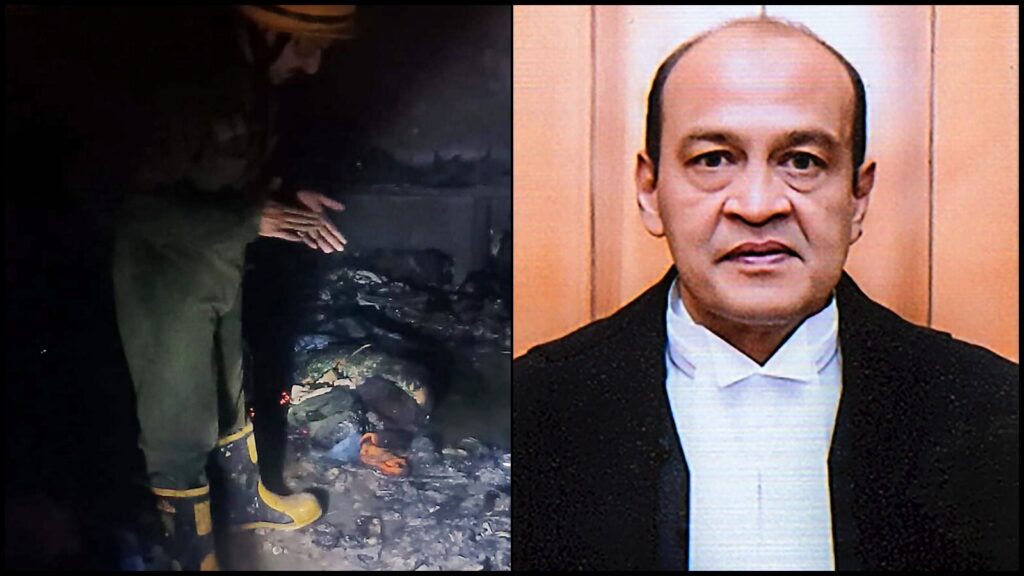Setting in motion the process to remove Justice Yashwant Varma of the Allahabad High Court, Lok Sabha Speaker Om Birla Tuesday constituted a three-member committee to probe charges against him in accordance with Section 3(2) of the Judges (Inquiry) Act 1968.
The inquiry committee comprises Justices Aravind Kumar and Manindra Mohan Shrivastava, and senior Karnataka High Court advocate B V Acharya.
Justice Varma was repatriated from the Delhi High Court to the Allahabad High Court after burnt wads of currency notes were allegedly found at his official residence in the Capital on March 14. An in-house probe was earlier set up by then Chief Justice of India Sanjiv Khanna into the matter, constituting Punjab and Haryana High Court Chief Justice Sheel Nagu, Himachal Pradesh High Court Chief Justice G S Sandhawalia and Karnataka High Court Justice Anu Sivaraman. On the basis of the panel’s findings, CJI Khanna had asked Justice Varma to resign, which he refused to do.
Last week, the Supreme Court dismissed Justice Varma’s plea against CJI Khanna’s recommendation for his removal.
The three who are part of the new probe, set up by Speaker Birla, against Justice Varma:
Justice Aravind Kumar
Appointed to the Supreme Court in February 2023, with a tenure set to continue till July 2027, Justice Arvind Kumar was earlier the Chief Justice of the Gujarat High Court. Starting in 1987 as a trial court lawyer, Justice Kumar practised for over two decades, handling both civil and criminal law.
He was also the Additional Central Government Standing Counsel for the Income Tax Department for 11 years and also a Special Public Prosecutor for the CBI. In 2005, he was appointed as an Assistant Solicitor General of India.
Elevated as a judge of the Karnataka High Court in 2009, he served there for nine years before becoming the Chief Justice of the High Court of Gujarat in 2021.
Justice Kumar has spearheaded initiatives in the field of education, and was instrumental in setting up ‘signal schools’ for children begging at traffic signals during his stints in both Karnataka and Gujarat High Courts.
In the Supreme Court, he authored a judgment issuing guidelines for lower courts to curb the pendency of cases, setting timelines for serving summons promptly, wrapping up written statements within 30 days, and encouraging alternative dispute redressal systems.
Justice M M Shrivastava
The Chief Justice of the Madras High Court, Justice Manindra Mohan Shrivastava did his bachelor’s in law from K R Law College, Bilaspur, before enrolling as an advocate in 1987. He built a diverse practice in constitutional, labour, service, education and election law, before both the Madhya Pradesh and the Chhattisgarh High Court, and in 2005, was designated a Senior Advocate by the latter court.
Justice Shrivastava’s judicial career began with his appointment to the Chhattisgarh High Court in 2009. In 2021, he was transferred to the Rajasthan High Court, where he served as Acting Chief Justice on three separate occasions, before being appointed as permanent Chief Justice in February 2024. In July 2025, he was transferred as Chief Justice of the Madras High Court.
In the Rajasthan High Court, Justice Shrivastava was part of a Bench that directed the state to provide reservations for transgender persons in public appointments. In another key ruling, he ordered the reinstatement of Ayurvedic doctors, equating their retirement age with that of their Allopathic counterparts. He also took a firm stance on judicial discipline, holding that strikes by bar associations were unlawful.
During his time in the Chhattisgarh High Court, he ruled that bail should ordinarily be granted to juveniles under the law.
If not elevated to the Supreme Court, Justice Shrivastava is due to retire in March 2026.
B V Acharya
Senior advocate B V Acharya was the former Advocate General of Karnataka. The 93-year-old veteran has had a legal career spanning over six decades, having joined the Bar in 1957. In December 1989, he was designated a senior advocate and months later, appointed as the highest-ranking law officer in Karnataka, a post he held for five terms.
For nearly two decades, Acharya had been every Karnataka chief minister’s pick for this top job, cutting across party lines – from S R Bommai and Veerappa Moily to H D Deve Gowda.
Acharya’s most challenging role, however, was as a Special Public Prosecutor in the disproportionate assets case against former Tamil Nadu Chief Minister J Jayalalitha. Appointed by the Supreme Court, he conducted the trial in the politically sensitive case from 2004 to 2012. In 2012, he resigned from the post, citing political pressure to remove him from the role. In 2014, the trial court acquitted Jayalalitha, which was confirmed by the High Court in 2015.
In 2016, Acharya was reinstated as Special Public Prosecutor in the case following Supreme Court orders, and ensured Jayalalithaa’s conviction.

